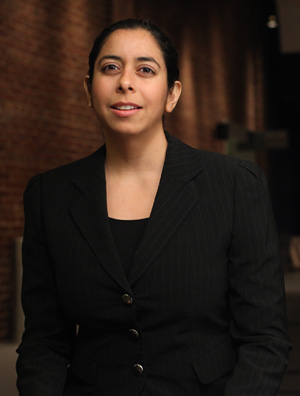Anu Bhagwati
Although 15% of active-duty American soldiers are now women, the gender gap in military culture remains. This is particularly true in the Marine Corps, the only branch of the armed services whose boot camp and Officer Training School are gender-segregated. Outnumbered 16 to one and isolated in its closed system, “Women Marines,” as the corps identifies them, face unrelenting hostility, spoken and unspoken.
Up and down the chain of command, crude terms for female body parts are routinely used as insults. Refusing a sexual overture or simply out-performing a serviceman often results in lesbian-baiting. Seeking equity, much less protection from harassment or assault, is regarded as a sign of weakness and betrayal.
When Anu Bhagwati finished her first three-mile fitness run at Quantico ahead of all of the women and most of the men in her platoon, her drill instructor accused her of skipping a lap. When she stood up in a basic training class of 300 to inquire when submarines would be gender-integrated, she was loudly booed. And when she could no longer stop or stomach the sexual harassment being directed at female NCOs by her second-in-command, her formal complaint was not only disregarded but the offending lieutenant was promoted to command a gender-integrated unit.
Having been eagerly recruited for Officer Candidate School, rising to the rank of captain, having proved her mettle at every assignment – becoming only the second woman in the history of the corps to complete close-combat instructor training – Bhagwati battled it out for five years before concluding that the only way to win her fight against the systematic misogyny, racism and homophobia in the Marine Corps was to take it outside.
Honorably discharged in 2004, Bhagwati went to graduate school to study public policy, slowly shedding years of indoctrination and recovering the self-assurance to speak without looking over her shoulder. Bhagwati helped to launch Service Women’s Action Network (SWAN) in 2007 to remedy the range of abuses suffered by servicewomen and women veterans.
Today, still sporting her USMC tattoo on her muscled upper arm, Bhagwati sees her challenge as engaging the public in a country where only 1% serve in the military. She testifies on the Hill, appears on television and radio news, writes op-eds and blogs on national newspaper websites. She explains why the 11% year-on-year increase in sexual assaults recorded by the Department of Defense represents a tiny fraction of actual incidents. Why, because they are technically excluded from ground combat, yet exposed to the same bullets, IEDs and carnage as men, women face unreasonable standards of proof when they seek help for post-traumatic stress disorder. And how those who are awarded health benefits must seek help at veterans’ facilities with few female physicians, counselors or women-only groups, little to no provision for childcare and broken promises of family healthcare.
With a part-time and volunteer staff of 6, “fueled primarily by adrenaline,” SWAN answers its peer helplines and expands its reach, partnering with pro bono lawyers, caseworkers and advocates for survivors of combat and sexual trauma, homeless veterans and servicemembers discharged under the “Don’t Ask Don’t Tell” policy. To overcome the obstacles of reentry, the anger and the guilt that Bhagwati understands all too well, SWAN also offers veterans hands-on healing, hosting writing workshops, weekly yoga and meditation classes and the respite of a community garden for the homeless.
 Photo by Joshua Cogan
Photo by Joshua Cogan